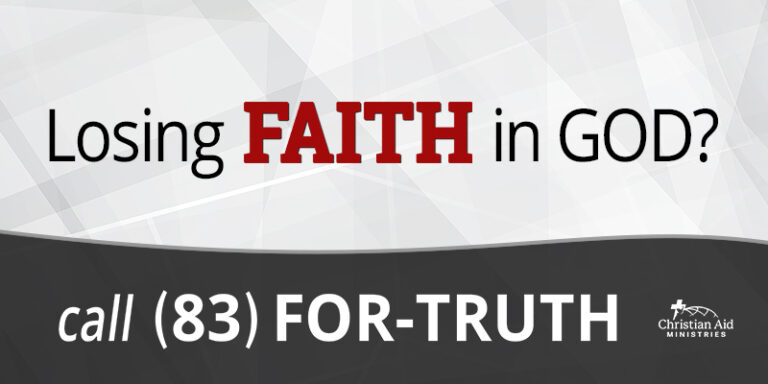Scenario Two: Dan
Dan had finished his packing early. He had his clothing, his wallet, and his new Apple MacBook Pro. Last of all he had carefully packed his Bible. He often read and studied the Bible on his computer, but he still liked to have a “real” Bible. One he could hold in his hand or lay on his heart when he prayed. You see, Dan was a Christian, and Jesus was his best friend, like he often told people.
Today was a big day, and Dan could hardly wait for his father to come home to pick him up. He was starting university next week, the next step toward his dream of someday becoming a missionary doctor.
While he waited, his mother came into the living room and sat on the couch beside him. She looked him in the face and smiled at his anticipation. But her smile faded as she shared a concern with him.
“Be careful, Dan,” she said softly. “There’s a lot of danger out there. You will meet girls who will throw themselves at you, and boys who will try to get you hooked on drugs. And you’ll meet teachers who will do their best to destroy your faith.”
Dan smiled at her intensity. Intensity was his mother’s trademark.
“Yes, Mom, I’ll be careful.” He looked out the window, but his father still hadn’t arrived. “It can’t be that much worse than high school. Besides, I picked up a book in town last week, meant for new college and university students. It’s by Josh McDowell, and it’s called ‘Don’t Check Your Brains at the Door.’ You’d like it. He talks a lot about all of those things.”
He jumped to his feet as his father drove in. “Don’t worry Mom. I’ll be okay.” He leaned over and gave her a quick kiss.
Dan had often imagined witnessing to his classmates and teachers. Maybe he could start a mini-revival at the university. But things didn’t work out quite as he had hoped. His first inkling of this came when he was unpacking his belongs and getting to know his roommate. His roommate, Steve, was lounging on his bed as they chatted. But he sat up with a start when he saw Dan place his Bible on his desk. “Hey, is that a Bible?” Steve looked as incredulous as he sounded. “You’re a big boy now. You won’t need that here.”
Dan tried to witness to his new friend about his faith, eager to make his first convert. But Steve brushed it aside and responded, “Look, it’s fine if you want to believe that; it doesn’t bother me. But it will go a lot better for you here if you don’t say a lot about it. Some of those professors can be nasty. I’ve seen what they do to Christians. If you want to pass, you’ve got to stay on their good side.”
Dan soon found out how right Steve was. The whole class erupted in laughter the first time he raised a question about God’s part in developing the world. He quickly discovered that he was just making a fool of himself, and it became harder and harder for him to take his stand for what he believed. Besides, now that he had taken his stand as a Christian, several of his professors took great pleasure in ridiculing him in front of the whole class and asking questions to which he had no answers.
He had day-dreamed of people admiring him for his faith. Instead, boys refused to have coffee with him and girls refused to date him.
Because of this, Dan was grateful when one of his professors took pity on him and befriended him. It felt good to be treated kindly after the scorn he had faced. But Dr. Beasley’s friendship was poison because he had secretly made it his goal to indoctrinate Dan in the areas where he disagreed with his teachers. Because of this friendship, Dan started to stray from his beliefs. By the end of the first year, he doubted a lot of what he had learned at home. By the end of the second year, he openly professed to be a skeptic. And by the time he was through medical school, he was a dyed-in-the-wool agnostic and atheist.
His mother seldom smiled anymore when he was around. He still smiled at her, but his smile had become condescending. It was too bad that his mother still held to her old-fashioned beliefs. He knew now how foolish they were. He could out argue any Christian in his town. And he did whenever he got a chance. Besides, he knew all their faults. They were just a group of hypocrites, and he found great delight in pointing that out to them.










136 Responses
Hi folks.
Still uselessly waiting for God to do something for me. Still just silence, absence and unanswered prayers. I am trying to have faith in God to be here for me but can’t find anything outside of the Bible that indicates that God is here for me. Since my last post God has seen fit to destroy what little family I had left. Both my niece, and step niece have decided that they are boys. They both demand that everyone acknowledge that they are boys and that everyone call them by their made up boy names. I explained that I could not do that as it would be a lie, thus willing sinning again God. They both now say that if I love them I will do as they ask and have cut me from their lives until I do. They claim that it hurts their feelings to call them girls and by their real names. Now my brother says that I have to prioritize family first over a stupid fictitious God. His words. I told him that I couldn’t put family first as God demands to be first, as is right. He then told me that I would never be allowed to be at his house when the girls are there, until I put family first. So the last of my family is gone. Also my father died. I will be honest and tell you that I didn’t care for him. He abandoned us when I was 7. He wasn’t involved in my life. But the bad news is how he died. He died by dementia. Something else that could go wrong later in life. A while back I tried to help a homeless man by giving him a hot meal, a place to shower, new clothes, and a Bible. Turned out the police in the process of clearing parks of homeless people, took everything he had two days later. Now because of that police action He almost died in the cold. He will be losing all his fingers, half of his toes on his left foot, while losing the right foot. Also because of the near death experience he now is brain damaged. No more capable that a 4 year old. This just enforces that I am to poor to help. True help would have gotten him off the street before he got hurt. Proves that I am useless. I feel guilty about his current situation as I should have done more. Life just keeps getting worse.
God bless you all, in Jesus holy name, Amen.
Kenneth, does God call us to a wonderful life here upon this earth? Did Jesus spend His life with everyone believing and obeying His word?
There will be suffering and trials. These things are given to us that we might be over-comers through Jesus Christ. Yes, family is important and love is paramount in relationships. True love has a choice. We can love those who do not return our love, just as God loves all creation but only those receive Jesus will have eternal life.
I hear you, Kenneth. I cannot imagine the difficulty you are facing with your family. I struggle with my family as well. My son has Autism and is non-verbal. It is the most difficult challenge I have ever faced in my life. I have family members (one of them is my brother) that do not understand my son or even try to understand him. My brother was at my house on Christmas Eve and he made a mocking remark about my son because he was running around the house due to overstimulation. My brother’s remark really hurt and I haven’t seen or spoken to him since then.
I cannot tell you to put God before your family or vice versa. You will know what is right in your heart. I have prayed and have held out for God countless times only to be let down and be left disappointed. I only try to do my best with my son and my family. If God wants to be a part of my life, my door is open. But my spiritual self is very drained and weary from all the waiting and praying. I hope things turn around for you and I soon.
Good luck to you and I wish you well.
A “reward” is not what one gives but what one “receives.” loving and obeying Good is a service /gift to God and not a reward.
“God wants us to reach out to Him in faith”
No he doesn’t. The book of Romans teaches that God arranged us to be born unable to do anything good (Ch.1-3), and that he has to do everything (Ch.9). God gives us no room to love him; he used Adam to make us incapable of love or faith.
You are correct, if the book of Romans is Paul laying out his understanding of the doctrine of salvation. However, a careful reading of Romans reveals that Paul is actually addressing the relationships between Gentile believers and the Jewish believers, who had recently returned to Rome. If one reads the book again to answer the question as to Paul’s thesis, the reason he wrote the book, it becomes obvious that the context of Ch. 9-11 is that divide between Jew and Gentile believers. And the interlocutor with which he argues is not Arminian, but Jewish!
The divine call of Abraham in Genesis is really about being selected for service, not about being chosen for salvation.
Exodus does speak of God hardening Pharaoh’s heart to glorify God; it speaks first of Pharaoh hardening his own heart. Pharaoh chose, then God honored Pharaoh’s choice.
God’s invitation is universal; those who accept it are predestined to salvation. It reminds me of two airplanes leaving the same airport at about the same time, one headed to New York, and the other to LAX. The airlines and the crew have predetermined where they plan to arrive. But the individual choices of each passenger determine which plane they board. God is sovereign and He has chosen the destiny of those who accept His invitation (and the destiny of those who don’t).
God does want us to reach out to Him in faith. He is the initiator! The only thing we are capable of is accepting His offer!
Hunting for scripture that suit our desires and thinking will only lead us in a path of destructive logic. James 4:8, Draw nigh to God, and He will draw nigh to you. Cleanse your hands, ye sinners; and purify your hearts… 1 John 1:9, If we confess our sins, He is faithful and just to forgive us our sins and cleanse us from all unrighteousness. Even in the OT God desires us to seek and search, Jer 29:13, …and ye shall seek me, and find me, when ye shall search for me with your heart. We are commanded to love one another, even as God has loved us. Is God’s love conditional? For God so loved the world that He gave his only begotten Son… God does not reside in the time, space, matter environment that we do. Due to His sovereign power He can interact with creation and know the result of His actions. Does a just God exclude those that desire to know Him? 2 Peter 3:9, The Lord is not slack concerning his promise, as some men count slackness; but is longsuffering to us-ward, not willing that any should perish, but that all should come to repentance. Matt 5:6, Blessed are they which do hunger and thirst after righteousness: for they shall be filled.
That would be just well since we know that Jesus were the way, but Christianity teaches that the church and orthodoxy and proselytism to Christianity is required to get to Jesus; or “extra ecclesiam, nulla salus.” This means that no matter how you seek after God, if you don’t pick the right religion, Jesus won’t save you. A hindu could follow Jesus’ commandments and love his neighbor, his God and his gods (we call them angels), better than a whole country’s worth of Christians, but because he “rejected” the right religion, he goes to hell.
He could absolutely worship Jesus in all but name, but because he rejects our church and our claims about Jesus’ doings, and our threats of God’s wrath, and our ideas of sin and holiness, God makes him “without excuse” and “gives him over” to being a depraved monster, and counts his faith, attitude, and the works thereof as “filthy rags” and sends him to hell.
We teach that if he rejects our story of Jesus as we know him (The Son of God, on top of being the uncreated goodness that he worships,) he doesn’t “believe upon” Jesus and is retroactively (John 3:17) condemned for all the sins in his life. And if Christendom’s hypocrisy is the reason that he rejects the Church, the church has had a hand in his damnation. Any court would excuse him of his error except for God’s (Romans 1:20).
All of evangelism rests itself on the threat of eternal torture for believing in the wrong theology. This is why the church has such a reputation for wickedness and hypocrisy in our ranks. We’re basically a protection racket with the power of hellfire as our mob.
Multiple religions claiming different things cannot be many truths. They can all be wrong, or one of them can be true and the rest wrong. Multiple gods with all of them claiming power, omniscience, and sovereignty could not exist in eternity together. Therefore a single creator-heavenly father-savior of mankind is the only equation that fits the narrative of truth. Find the truth and find God, the one true and living God who is eternal with no beginning nor end, the alpha and omega. The path to heaven is a single way, just as God is one, with Jesus Christ holding the path to eternal life. Why, because He has shown that He, and He alone, has the power of life over death by coming forth from grave.
Yeah, you’re saying exactly what I said, with more pious words. It still means that Jesus’ love stops at the doors of the church, and that because light is a particle, it means that you can’t tolerate the possiblity that light is a wave. It also still means that Jer. 29 does not apply today, since there are those who seek God but will not find him, because Jesus made the way narrow. In Christianity, God stopped rewarding the pious when Jesus died, and now only rewards Churchmembers, sending everyone else to hell.
There is a unique relationship between the foreknowledge of God and His calling, His interaction into the lives of His creation, and the ability of creation to exert the choice of their own desires. Gods’ foreknowledge does not exempt nor dictate His interaction in our lives, even though we make our choice to walk the path of right living or one of destruction. It appears you see God as as an unjust creator, which if he was, he could not be God. On the contrary God is just (Deu 32:4) and His ways past finding out. He is Eternal, True and Holy. God rewards those who seek His face and desire His will in their life. Read Matt 5:6. I pray you find the truth through Jesus Christ.